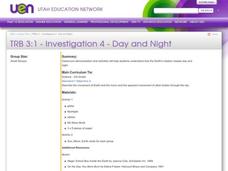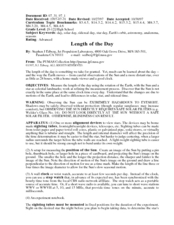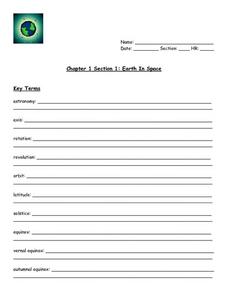Curated OER
Day and Night
Third graders view a classroom simulation that demonstrates how the Earth's rotation creates day and night.
Curated OER
Length of the Day
Students investigate how the Earth's rotation affect the length of day. In this earth science lesson, students construct a sighting apparatus and record their observations over a few days. They analyze data collected and formulate a...
National Science Teacher Association
Middle School Sampler: Science
Focus on inquiry-based learning in your science class with a series of activities designed for middle schoolers. A helpful packet samples four different texts, which include activities about predator-prey relationships, Earth's axis and...
Glynn County School System
Earth's Magnetic Field and the Moon
The surface of the moon has an amazing tale to tell. Learn about the moon's story with a PowerPoint presentation that describes the unique features of the moon's surface as well as explains its movement in relation to Earth.
Curated OER
What Orbital Dynamic Variables are Responsible for Earth's Weather?
Students explore the changing of the seasons. In this astronomy and seasons instructional activity, students construct a model of the revolution of the sun and the moon. Students compare the recorded solstice/equinox orbital positions...
Curated OER
Earth in Space
In this reason for the days and nights on earth worksheet, students study the reasons the Earth has days and nights by answering 28 questions about earth's rotation, the equator, the relationship between the sun and moon, and the earth's...
Curated OER
Orbit, rotation, revolution of Earth
Eighth graders define orbit, rotation and revolution. They demonstrate the orbit, rotation and revolution of the Earth. Students identify the types of measurements and the instruments that used for orbit, rotation and revolution. They...
Curated OER
View of a Comet from Earth
Young scholars investigate comets. In this space science instructional activity, students study overhead transparencies of the orbits of Earth and a comet. Young scholars identify various locations and times where comets would be visible...
T. Smith Publishing
Earth
Young astronomers read an informational text passage and then answer questions based on what they read.
media.yurisnight.net
Science Lesson Plan: Our Solar System: I Wonder?
Ever wonder why Pluto isn't considered a planet? Or how large the Earth is compared to the other inner planets? Explore the universe with a series of projects that simulate different aspects of our solar system. The activities require...
Curated OER
How Does the Sun Affect the Earth?
In this sun worksheet, students brainstorm the different ways the sun affects the Earth. This worksheet is a graphic organizer.
Curated OER
Adding the Moon: Using a Classroom Model to Explore the Movement of the Sun, Earth, and Moon
Students observe and discuss motions of the Earth and the Moon as they spin and orbit the Sun.
Curated OER
The Four Seasons - Earth's Axis
Young scholars discover that it is the tilt of the earth's axis that results in the seasons. They clarify common misconceptions about the earth's orbit around the sun.
Curated OER
Planet Earth
For this Earth worksheet, students review the characteristics of the Earth including it's rotation and revolution. This worksheet has 9 fill in the blank and 7 short answer questions.
Curated OER
The Earth-Sun-Moon System
Third graders construct a model of the earth-sun-moon system using students as the sun, moon, and earth. They discuss ways that time is related to the movement of the earth and moon.
Curated OER
Earth, Moon, Mars Balloons
Students demonstrate size and orbits of Earth, Moon, and Mars. In this space science lesson plan, students will use balloons to show how the size and distance between the planets and satellite compare.
Curated OER
Comparing Earth and Mars
Students work together to compare and contrast Mars and Earth. Using the internet, they answer questions given to them by their teacher and calculate answers showing their work. They graph their answers and discuss the results of the...
World Wildlife Fund
Land of the Midnight Sun
From days of 24 hour sunlight, to endless nights that last for days, the Arctic is a very unique place to live. Examine the seasonal changes that occur in the northern-most reaches of the globe and the impact they have on the plants and...
University of Arizona
The Exotic Vacation
Students explain the concepts and vocabulary of Earth's rotation. They plan imaginary vacations based on the seasons in different locations. This is a very creative lesson plan, which students enjoy.
S2tem Centers SC
Seasons
Winter, spring, summer, and fall—take the learning of the seasons beyond the elementary level to the middle school classroom. Curious learners begin by watching videos about the seasons and the rotation of planet Earth. Then, they...
Lake Afton Public Observatory
Shadows, Angles, and the Seasons
Shine some light on the topic of seasonal change with this collection of activities. Whether it's by measuring the change in the length of their shadows, or modeling the earth's orbit around the sun using a lamp and a globe, these simple...
PBS
Why Isn't There an Eclipse Every Month?
Searching for an eclipse activity that sends scholars over the moon? Try an interesting interactive to get their minds active! The resource, part of an extensive Space series from PBS Learning Media, uses modeling and data analysis to...
Curated OER
Heating the Earth
Middle schoolers explore how the angle of sunlight affects the Earth's temperature and seasons and then apply this understanding to their local situation.
Curated OER
Our Sun and the Four Seasons
Students discover the relationship between the sun and Earth. In this weather lesson plan, students examine the effect of the sun on the Earth's seasons. Students complete a weather activity using props to simulate the sun and Earth's...

























